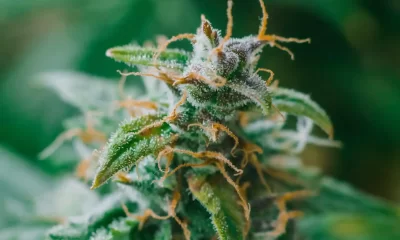Business
Why Did Arkansas’ Cannabis Legalization Fail? And What Happens Next?

This time around, the proposed legalization measure was rejected by both marijuana opponents and advocates who argued that it was not comprehensive enough.
Arkansas voters defeated the recreational marijuana legalization ballot measure in Tuesday’s midterms. The measure failed to receive enough votes, surprising many as a recent poll showed a comfortable majority of likely voters had favored the ballot measure. On Tuesday, however, voting broke down with 57% against legalization and 43% in favor.
Arkansas was one of five states voting on cannabis legalization in this year’s midterms. Only Missouri and Maryland voted in favor of legalizing adult-use cannabis.

Why Did The Measure Fail?
This time around, the proposed legalization measure was rejected by both marijuana opponents and advocates who argued that it was not comprehensive enough, reported Arkansas Advocate.
Arkansas was one of five states voting on cannabis legalization in this year’s midterms. Only Missouri and Maryland voted in favor of legalizing adult-use cannabis.

Why Did The Measure Fail?
This time around, the proposed legalization measure was rejected by both marijuana opponents and advocates who argued that it was not comprehensive enough, reported Arkansas Advocate.
Melissa Fults, an advocate for medical marijuana patients, was against Issue 4 though on Wednesday she said she’d help lead a 2024 initiative effort. She has plans to partner with the attorney who drafted the 2016 medical marijuana amendment and that they’d address Issue 4’s shortcomings.
What Was In Issue 4?
The measure would have legalized cannabis use for people 21 and older and would authorize the commercial sale of marijuana with 10% taxes. Of the collected tax revenue, 15% was set to be used to fund an annual stipend for all full-time law enforcement officers certified by the Commission on Law Enforcement Standards and Training that they’re in good standing.
Under the initiative, sponsored by the group Responsible Growth Arkansas, adults would have been allowed to possess up to one ounce of cannabis, while home growing would not have been allowed.
Furthermore, the measure would have enabled Arkansas’ current medical marijuana licensees to sell cannabis at their existing locations and establish one additional location for commercial sales only. An additional 40 licenses would have been granted to businesses via a lottery.
The Alcoholic Beverage Control (ABC) Division of the Department of Finance and Administration would have been in charge of regulating the program and issuing cannabis business licenses.
The measure did not contain any provisions for expunging or sealing past criminal records for cannabis convictions or providing social equity licensing opportunities for people from communities most impacted by the War on Drugs.

What’s Next?
“We’ll have expungement, home grow and greatly expand the industry and make it more affordable for everyday people to get into the industry,” Fults said.
A campaign official for Responsible Growth Arkansas told the Arkansas Democrat-Gazette on Tuesday that the group could introduce another amendment to voters in 2024.
“We are proud of what we have done and the first time in history that this has been on the ballot, and we are going to go back and look back at what we can do next time and bring it back to the voters in 2024,” said Robert McLarty, campaign director for Issue 4.
Eddie Armstrong, chairman of Responsible Growth, didn’t confirm any plans for another amendment in two years, though he stated, “Responsible Growth Arkansas was committed to responsibly expand the adult use of cannabis in Arkansas, attempting to become the first southern state to pass this through a citizens’ driven initiative on the ballot. While hundreds of thousands of Arkansans supported this effort it came up short in the end. We thank all those who worked to place this initiative on the ballot and supported our campaign with their voice and their vote.”
Opponents Also Have Plans
On the other hand, marijuana legalization opponents believe in their strengths as well. Jerry Cox, director of the anti-marijuana Family Council Action Committee said the organization plans to continue to fight against legalization.
“Any future recreational marijuana effort will be hampered by the fact that wealthy donors spent over $15 million on this campaign and came away with nothing to show for it,” Cox said. “They will think twice before doing that again. They took their best shot and failed. We took their best shot and won. It will be interesting to see how much money future efforts will be able to raise.”

Previous Cannabis Efforts In Arkansas
After securing more than enough valid signatures, the initiative to legalize recreational marijuana was turned down by the State Board of Election Commissioners in August 2022. The commissioners dismissed the amendment citing the lack of certain guidelines as the reason. More precisely, the commissioner rejected the measure on the grounds of the ballot title not being clear enough in terms of its impacts, with the main issue being the level of THC allowed in cannabis edibles.
Several hours before the initiative was rejected, Governor Asa Hutchinson encouraged law enforcement to “stand firm” against marijuana legalization, saying “Marijuana is a harmful drug.”
Quickly after, Responsible Growth Arkansas filed an appeal with the Arkansas Supreme Court to overturn a decision by the Arkansas Board of Election Commissioners that ban a proposed amendment to reach the November ballot.
The Arkansas Supreme Court ruled in September that voters can decide whether to legalize recreational cannabis, after all, overturning a decision by the Board of Election Commissioners.
“We give the ballot title a liberal construction and interpretation in order that it secure the purposes of reserving to the people this power,” the court said. “And we recognize that it is impossible to prepare a ballot title that would suit everyone. With these standards in mind, we conclude that the ballot title at issue is complete enough to convey an intelligible idea of the scope and import of the proposed amendment.”
Whatever happens next, it is clear that both proponents and opponents will continue to fight with all their strength for what they believe.
Business
New Mexico cannabis operator fined, loses license for alleged BioTrack fraud

New Mexico regulators fined a cannabis operator nearly $300,000 and revoked its license after the company allegedly created fake reports in the state’s traceability software.
The New Mexico Cannabis Control Division (CCD) accused marijuana manufacturer and retailer Golden Roots of 11 violations, according to Albuquerque Business First.
Golden Roots operates the The Cannabis Revolution Dispensary.
The majority of the violations are related to the Albuquerque company’s improper use of BioTrack, which has been New Mexico’s track-and-trace vendor since 2015.
The CCD alleges Golden Roots reported marijuana production only two months after it had received its vertically integrated license, according to Albuquerque Business First.
Because cannabis takes longer than two months to be cultivated, the CCD was suspicious of the report.
After inspecting the company’s premises, the CCD alleged Golden Roots reported cultivation, transportation and sales in BioTrack but wasn’t able to provide officers who inspected the site evidence that the operator was cultivating cannabis.
In April, the CCD revoked Golden Roots’ license and issued a $10,000 fine, according to the news outlet.
The company requested a hearing, which the regulator scheduled for Sept. 1.
At the hearing, the CCD testified that the company’s dried-cannabis weights in BioTrack were suspicious because they didn’t seem to accurately reflect how much weight marijuana loses as it dries.
Company employees also poorly accounted for why they were making adjustments in the system of up to 24 pounds of cannabis, making comments such as “bad” or “mistake” in the software, Albuquerque Business First reported.
Golden Roots was fined $298,972.05 – the amount regulators allege the company made selling products that weren’t properly accounted for in BioTrack.
The CCD has been cracking down on cannabis operators accused of selling products procured from out-of-state or not grown legally:
- Regulators alleged in August that Albuquerque dispensary Sawmill Sweet Leaf sold out-of-state products and didn’t have a license for extraction.
- Paradise Exotics Distro lost its license in July after regulators alleged the company sold products made in California.
Golden Roots was the first alleged rulebreaker in New Mexico to be asked to pay a large fine.
Source: https://mjbizdaily.com/new-mexico-cannabis-operator-fined-loses-license-for-alleged-biotrack-fraud/
Business
Marijuana companies suing US attorney general in federal prohibition challenge

Four marijuana companies, including a multistate operator, have filed a lawsuit against U.S. Attorney General Merrick Garland in which they allege the federal MJ prohibition under the Controlled Substances Act is no longer constitutional.
According to the complaint, filed Thursday in U.S. District Court in Massachusetts, retailer Canna Provisions, Treevit delivery service CEO Gyasi Sellers, cultivator Wiseacre Farm and MSO Verano Holdings Corp. are all harmed by “the federal government’s unconstitutional ban on cultivating, manufacturing, distributing, or possessing intrastate marijuana.”
Verano is headquartered in Chicago but has operations in Massachusetts; the other three operators are based in Massachusetts.
The lawsuit seeks a ruling that the “Controlled Substances Act is unconstitutional as applied to the intrastate cultivation, manufacture, possession, and distribution of marijuana pursuant to state law.”
The companies want the case to go before the U.S. Supreme Court.
They hired prominent law firm Boies Schiller Flexner to represent them.
The New York-based firm’s principal is David Boies, whose former clients include Microsoft, former presidential candidate Al Gore and Elizabeth Holmes’ disgraced startup Theranos.
Similar challenges to the federal Controlled Substances Act (CSA) have failed.
One such challenge led to a landmark Supreme Court decision in 2005.
In Gonzalez vs. Raich, the highest court in the United States ruled in a 6-3 decision that the commerce clause of the U.S. Constitution gave Congress the power to outlaw marijuana federally, even though state laws allow the cultivation and sale of cannabis.
In the 18 years since that ruling, 23 states and the District of Columbia have legalized adult-use marijuana and the federal government has allowed a multibillion-dollar cannabis industry to thrive.
Since both Congress and the U.S. Department of Justice, currently headed by Garland, have declined to intervene in state-licensed marijuana markets, the key facts that led to the Supreme Court’s 2005 ruling “no longer apply,” Boies said in a statement Thursday.
“The Supreme Court has since made clear that the federal government lacks the authority to regulate purely intrastate commerce,” Boies said.
“Moreover, the facts on which those precedents are based are no longer true.”
Verano President Darren Weiss said in a statement the company is “prepared to bring this case all the way to the Supreme Court in order to align federal law with how Congress has acted for years.”
While the Biden administration’s push to reschedule marijuana would help solve marijuana operators’ federal tax woes, neither rescheduling nor modest Congressional reforms such as the SAFER Banking Act “solve the fundamental issue,” Weiss added.
“The application of the CSA to lawful state-run cannabis business is an unconstitutional overreach on state sovereignty that has led to decades of harm, failed businesses, lost jobs, and unsafe working conditions.”
Business
Alabama to make another attempt Dec. 1 to award medical cannabis licenses

Alabama regulators are targeting Dec. 1 to award the first batch of medical cannabis business licenses after the agency’s first two attempts were scrapped because of scoring errors and litigation.
The first licenses will be awarded to individual cultivators, delivery providers, processors, dispensaries and state testing labs, according to the Alabama Medical Cannabis Commission (AMCC).
Then, on Dec. 12, the AMCC will award licenses for vertically integrated operations, a designation set primarily for multistate operators.
Licenses are expected to be handed out 28 days after they have been awarded, so MMJ production could begin in early January, according to the Alabama Daily News.
That means MMJ products could be available for patients around early March, an AMCC spokesperson told the media outlet.
Regulators initially awarded 21 business licenses in June, only to void them after applicants alleged inconsistencies with how the applications were scored.
Then, in August, the state awarded 24 different licenses – 19 went to June recipients – only to reverse themselves again and scratch those licenses after spurned applicants filed lawsuits.
A state judge dismissed a lawsuit filed by Chicago-based MSO Verano Holdings Corp., but another lawsuit is pending.
Source: https://mjbizdaily.com/alabama-plans-to-award-medical-cannabis-licenses-dec-1/
-

 Business2 years ago
Business2 years agoPot Odor Does Not Justify Probable Cause for Vehicle Searches, Minnesota Court Affirms
-

 Business2 years ago
Business2 years agoNew Mexico cannabis operator fined, loses license for alleged BioTrack fraud
-

 Business2 years ago
Business2 years agoAlabama to make another attempt Dec. 1 to award medical cannabis licenses
-

 Business2 years ago
Business2 years agoWashington State Pays Out $9.4 Million in Refunds Relating to Drug Convictions
-

 Business2 years ago
Business2 years agoMarijuana companies suing US attorney general in federal prohibition challenge
-

 Business2 years ago
Business2 years agoLegal Marijuana Handed A Nothing Burger From NY State
-

 Business2 years ago
Business2 years agoCan Cannabis Help Seasonal Depression
-

 Blogs2 years ago
Blogs2 years agoCannabis Art Is Flourishing On Etsy













